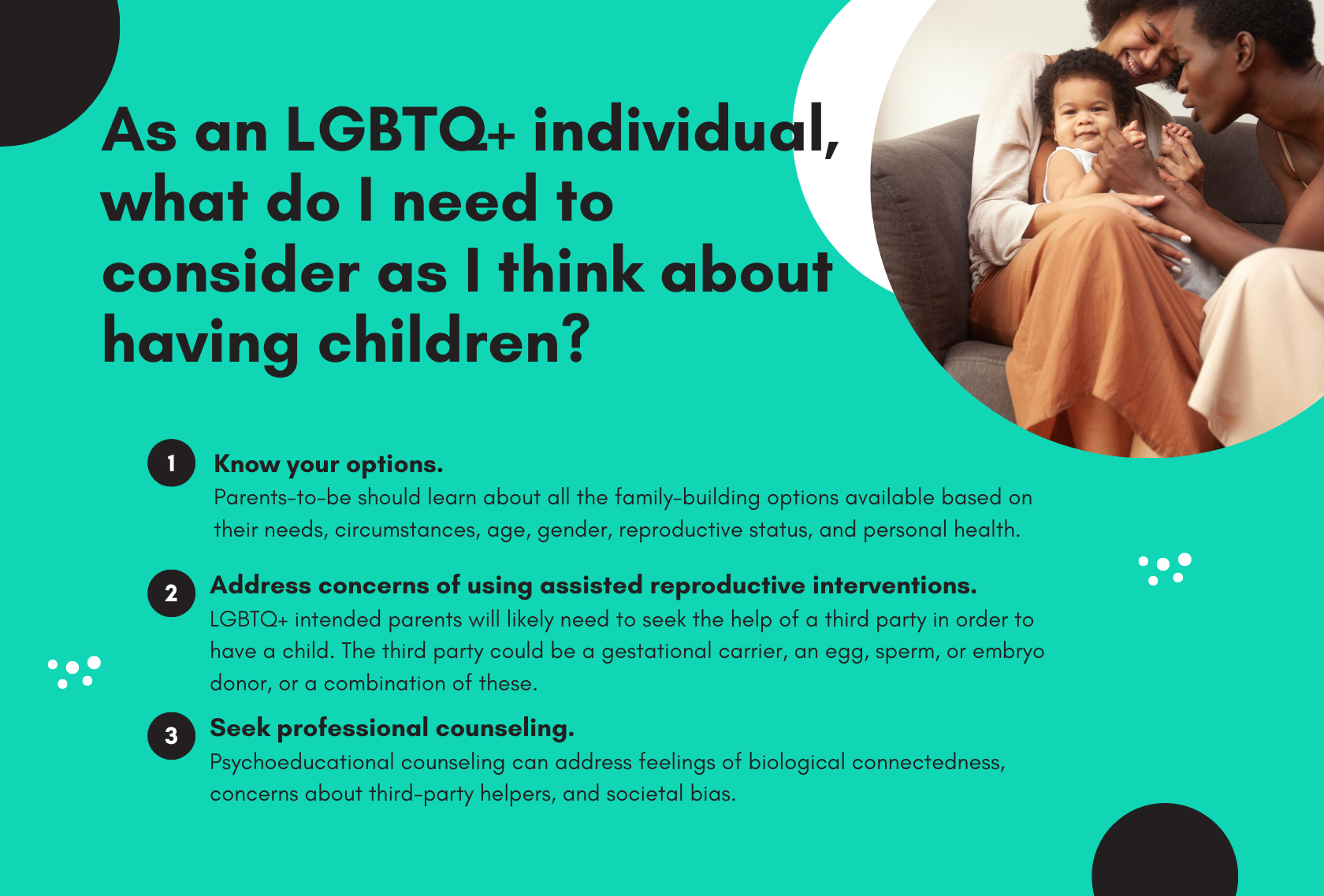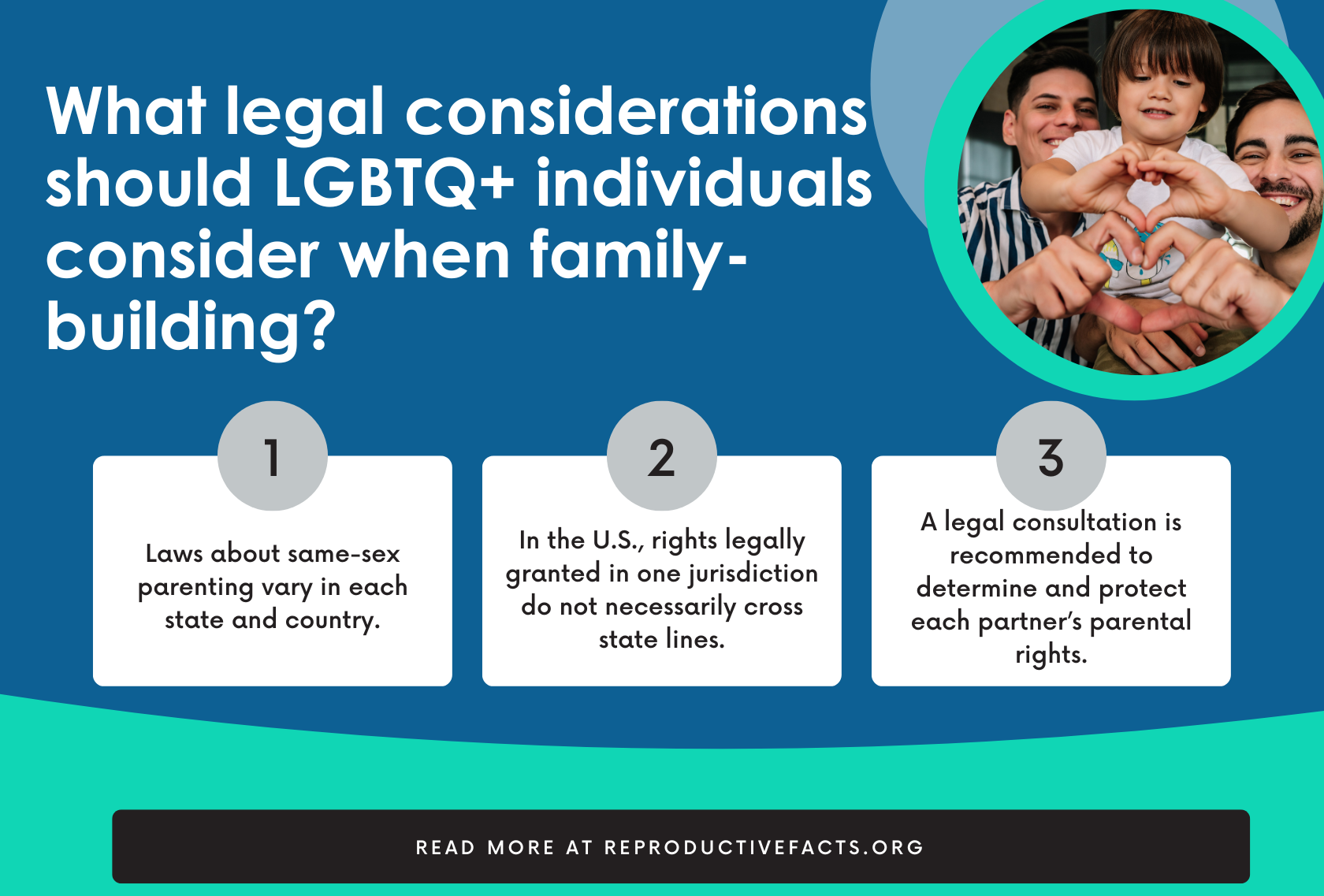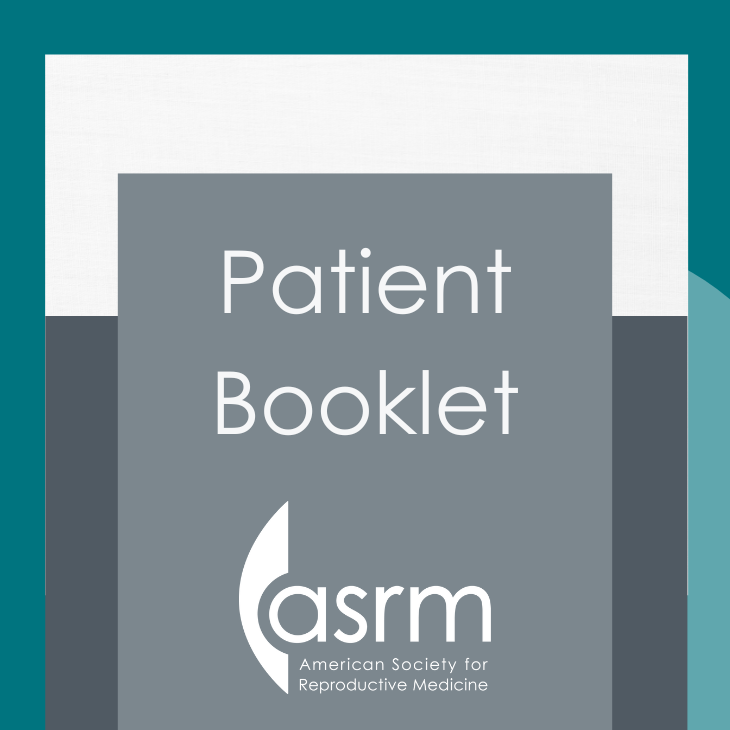Counseling Issues to Discuss With Gay Men and Lesbians Seeking Assisted Reproductive Technology (ART)
More lesbian, gay, bisexual, and transgender (LGBTQ+) individuals and couples are deciding to have children. Many of these individuals and couples choosing to build a family through assisted reproductive technology (ART) have concerns about how to best nurture and protect their children. It may be helpful to consider these challenges through psychoeducational and legal counseling before starting the family-building process.
Laws about same-sex parenting vary from state to state (and country to country). Specific statutes about civil unions, same-sex legal marriage, and parentage can have a big impact on how individuals choose to build their families. It is important to understand that rights legally granted in one jurisdiction do not necessarily cross state lines. A legal consultation is suggested to determine each partner’s parental rights.
Counseling can help individuals (children and parents) address feelings and responses to sociocultural challenges for same-sex and LGBTQ+ families. LGBTQ+ families are sometimes marginalized and discriminated against. This can happen in ways that are obvious and ways that are subtle. Counseling can also help parents teach their children how to handle situations or remarks that are inappropriate or hurtful.
Studies have found that children of gay or lesbian parents are no different than children of heterosexual parents in terms of their emotional development or relationships with others. Research shows that the quality of the parent-child relationship, not the sexual orientation of the parent, makes healthy children.
LGBTQ+ individuals sometimes have personal biases and concerns related to his/her homosexuality or “right” to have children. These attitudes may come from life experiences or from having negative views about one’s own sexuality. These biases and concerns could impact the relationship between parent and child.
It may be helpful to explore these biases and prejudices before starting assisted reproduction to become a parent. Counseling topics might include the parent(s)’ level of openness about his/her/their sexuality to family members, friends, coworkers, or the community at large.
The need to use assisted reproductive interventions adds concerns and worries for any parent-to-be. Psychoeducational counseling can address feelings of biological connectedness, concerns about third-party helpers, and societal bias.
Psychoeducational counseling is an important part of the family-building process to help LGBTQ+ families address personal, medical, and societal challenges. It will help them to process and think through their feelings about what it means to become a parent and how to raise a healthy, confident, and happy child.
 Counseling focuses on the best interests of the offspring and should discuss the following four topics:
Counseling focuses on the best interests of the offspring and should discuss the following four topics:
Medical options and considerations:
Parents-to-be should learn about family-building options most suitable to their situation based on their age, gender, reproductive status, and personal health. Gay or lesbian intended parents will need to seek the help of a third party in order to have a child. The third party could be a gestational carrier, an egg, sperm, or embryo donor, or both. How and where to identify a suitable third-party healthcare provider should be addressed.
Knowledge of legal statutes:
Laws about same-sex parenting vary from state to state (and country to country). Specific statutes about civil unions, same-sex legal marriage, and parentage can have a big impact on how individuals choose to build their families. It is important to understand that rights legally granted in one jurisdiction do not necessarily cross state lines. A legal consultation is suggested to determine each partner’s parental rights.
Sociocultural climate:
Counseling can help individuals (children and parents) address feelings and responses to sociocultural challenges for same-sex and LGBTQ+ families. LGBTQ+ families are sometimes marginalized and discriminated against. This can happen in ways that are obvious and ways that are subtle. Counseling can also help parents teach their children how to handle situations or remarks that are inappropriate or hurtful.Studies have found that children of gay or lesbian parents are no different than children of heterosexual parents in terms of their emotional development or relationships with others. Research shows that the quality of the parent-child relationship, not the sexual orientation of the parent, makes healthy children.
 Personal biases and emotional challenges:
Personal biases and emotional challenges:
LGBTQ+ individuals sometimes have personal biases and concerns related to his/her homosexuality or “right” to have children. These attitudes may come from life experiences or from having negative views about one’s own sexuality. These biases and concerns could impact the relationship between parent and child.It may be helpful to explore these biases and prejudices before starting assisted reproduction to become a parent. Counseling topics might include the parent(s)’ level of openness about his/her/their sexuality to family members, friends, coworkers, or the community at large.
The need to use assisted reproductive interventions adds concerns and worries for any parent-to-be. Psychoeducational counseling can address feelings of biological connectedness, concerns about third-party helpers, and societal bias.
Other questions that come up during counseling can include:
- How and what to disclose to children born to same-sex parents?
- What to say about the donor or carrier?
- How to respond to questions about who is the “real” parent?
- Does the non-genetic or non-biological parent have the status of a “real” parent, one whose rights and responsibilities are established and respected?
A final thought….
Psychoeducational counseling is an important part of the family-building process to help LGBTQ+ families address personal, medical, and societal challenges. It will help them to process and think through their feelings about what it means to become a parent and how to raise a healthy, confident, and happy child.
Fact Sheets/Booklets
View more fact sheets and booklets written by the ASRM Patient Education Committee.
Assisted Reproductive Technologies (booklet)
This booklet will help you understand in vitro fertilization (IVF) and other assisted reproductive technology (ART) that have become accepted medical treatments for infertility.
Hormonal Contraception
Hormonal contraceptives contain a progestin (progesterone medicine) with or without an estrogen.
What do I need to know about Zika virus and trying to have a baby?
Common symptoms include fever, rash, joint pain, conjunctivitis (red eyes), muscle pain, and headache.
Third-Party Reproduction
The phrase “third-party reproduction” refers to involving someone other than the individual or couple that plans to raise the child (intended parent[s]) in the process of reproduction.LGBTQIA
Find a Health Professional
Connect with reproductive medicine experts who will guide you through your unique journey. Our search tool allows personalized matches based on location, specialization, and expertise. Take control of your reproductive health with compassionate providers, innovative treatments, and unwavering support.
Search for an Expert











